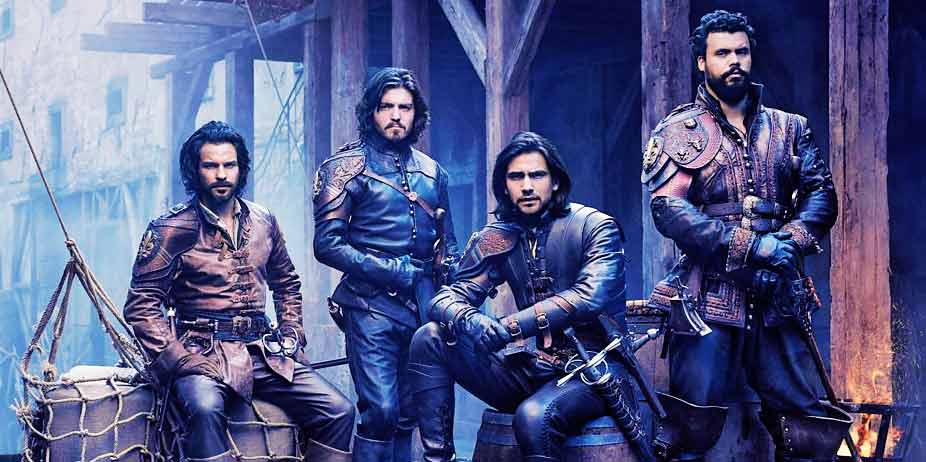
The Musketeers, Season Three (2016)
When a show is successful, the audience knows what to expect and what it likes. Changing the format, altering the characters, or creating an entirely new approach to the material meets with mixed results -- or cancelation. Alas, this is what befell The Musketeers. Once a tongue in cheek series, full of historical adventures, charm, wit, and nefarious villains, the third season became darker, progressively less funny, and a good deal more depressing, killing off a major character before the end, but at least concluding on a happy note...
France is at war with Spain, the musketeers forced onto battlefields, often outnumbered and reliant on supplies that never come. D'Artangan (Luke Pasquino), Porthos (Howard Charles), and Athos (Tom Burke) fight side by side, determined to strive for victory for king and country, while Aramis (Santiago Cabrera), based on a promise to God, takes up residence in a local monastery as a priest, handling orphaned children. But when a scheme goes array, sending murderous vagabonds into the cloisters, Aramis must make a choice -- to stand by, renounce his greater "talents," and remain a pacifist, or forsake his vow and rejoin his friends, in defending France from those who seek to exploit its people.
Unfortunately, greater adversaries seem to be working against them -- not the least of which being the king's bastard brother, Marquis de Feron (Rupert Everett). A hunchbacked cripple of tremendous ambition and unfortunate scruples (from his henchman's point of view), he intends to sink his claws ever further into France... scheming against King Louis (Ryan Gage), who has become increasingly distant emotionally from his wife, Anne (Alexandra Dowling). As the king's health declines in secret, he debates whom to leave in charge of the regency until their child comes of age... and that question remains on everyone's mind, as a series of dramatic events unfurl, leading to disclosed secrets, spilled confessions, and Athos' discovery of a soul mate in an unexpected place.
The passion, fun, and enthusiasm from former seasons is lacking -- some people prefer this darker, more serious, more adult approach, even though it's at the sacrifice of character development. I've never encountered such a dramatic shift in storytelling or presentation before, nor was aware that you can write a series in such a way that its central characters become background noise, and by the end, you feel strangely as if you haven't spent any time with them at all. Somehow, in former seasons, I got to know these characters, watched them develop, came to like them even while disliking their decisions -- here, few moments struck me with much weight, I felt as if I didn't get to spend much time with them, and had grown so detached from them that when one dies, I ... didn't care. Constance () was a flush of delight in the first two seasons, a perky, opinionated, good-natured, compassionate woman of strength -- here, she turns up once in awhile "leading the Musketeers" but hasn't much dialogue or development. There are three villains this season (two, too many), none of whom have explained back stories or motivations for their actions, other than Feron, and Lady DeWinter is absent right until the end, at which point I wondered where she came from!
It's a darker, grittier, less pretty world, though the costumes are still fine to look at from time to time. The final episode is the best. It features a power shift, establishes a new future for the musketeers on the whole, enables a powerful resolution to all earlier plot lines -- and has a bittersweet resonance to it, a fine send-off and, alas, despite the lack of humor, what I wish the entire season had been like. I had no problems purchasing the first two seasons, but won't own this one -- I have no interest in watching it again, and that's perhaps the greater tragedy of it.
Sexual Content:
Several implications of sex (couples kiss and undress; one
is a montage toward the end of the series); a woman falls pregnant out of
wedlock, references to an adulterous affair, women are threatened with rape.
Language:
Scattered profanities, and uses of "God" as exclamations.
Violence:
Mass casualties from bullets, arrows, and swords, never that
gruesome.
